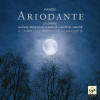Texte paru dans: / Appeared in:
*
International Record Review - Vol. 11, # 6 - (06/2011)
Pour
s'abonner / Subscription information

Virgin 0708442 (3CD)
Excerpt:
Joyce DiDonato, our new Ariodante, holds her head high in such company. Blessed with a more beautiful voice than either Murray or von Otter, she does not, perhaps, plumb the depths of despair in ‘Scherza infida’ as movingly as do Baker and Hunt, but her bravura technique — great Rossini singer than she is — is second to none in ‘Dopo notte’. She also brings a rich palette of vocal colour and emotional nuance to Ariodante’s other sublime arias: the rapt entrance aria, ‘Qui d’amor nel suo linguaggio’, anticipating blissful union with Ginevra, and angry ‘Cieca notte’ of Act 3, when Dalinda confesses her guilt and Ariodante rages at himself for his ‘blindness’ in the night — the imagery of seeing and unseeing, light and darkness permeate the libretto with cumulative force. DiDonato is formidable here. My only quibble is that her sometimes fanciful da capo decorations do not sound authentically Handelian, but this applies to all of the principals here, so Curtis presumably sanctioned (or wrote) them.
Otherwise, I have nothing but praise for perhaps the most consistently well-cast Ariodante on record: Karina Gauvin’s Handel credentials are by now well established on disc and her Ginevra is one of her finest achievements to date: light, agile and skittish in ‘Volate amori’ as she looks forward to her marriage, heart-rending in ‘Il mio crudel martoro’ as she contemplates rejection and death. For Polinesso — a travesty role written for a female alto — Curtis eschews the recent fashion for casting a countertenor and follows Minkowski’s preference for a contralto: Curtis’s lush-voiced Marie-Nicole Lemieux is more of a Baroque stylist than Minkowski’s booming Ewa Podles but still fruity-sounding by hard-core period standards. Sabina Puértolas is a new name to me — there are no artist biographies in the booklet — but she proves a delightful, ultimately remorseful Dalinda and her bright soprano blends well with Topi Lehtipuu’s ideally lyrical Lurcanio. The Briton Matthew Brook — until recently one of John Eliot Gardiner’s Monteverdi Choristers — proves himself an outstanding Handel bass as the King of Scotland, vocally only slightly less glamorous than Samuel Ramey, and Curtis restores for him an aria, ‘Invida sorte avara’, which Handel wrote for Act 2 but eventually dropped.
This recording also has more of the ballet music than any other, so it can claim to be the first really complete — indeed more than complete — complete recording. For that reason alone it is a must for Handelians, but Curtis’s cast, his always sensible approach to tempo — ‘Scherza infida’ is slowish, but, unlike Minkowski’s, it doesn’t drag — and the superb playing of his Complesso Barocco put this set close to the top of the Aniodante pile. I would never wish to forgo Baker and Hunt, but overall, this new set wins my vote.
Cliquez l'un ou l'autre
bouton pour découvrir bien d'autres critiques de CD
Click either button for many other reviews


